Discover the timeless wisdom of Hazrat Ali with these 9 powerful quotes in Urdu. These quotes offer deep insights on life, faith, friendship, and morality, reflecting his profound teachings. Perfect for anyone seeking inspiration, guidance, or understanding of Hazrat Ali’s philosophy.
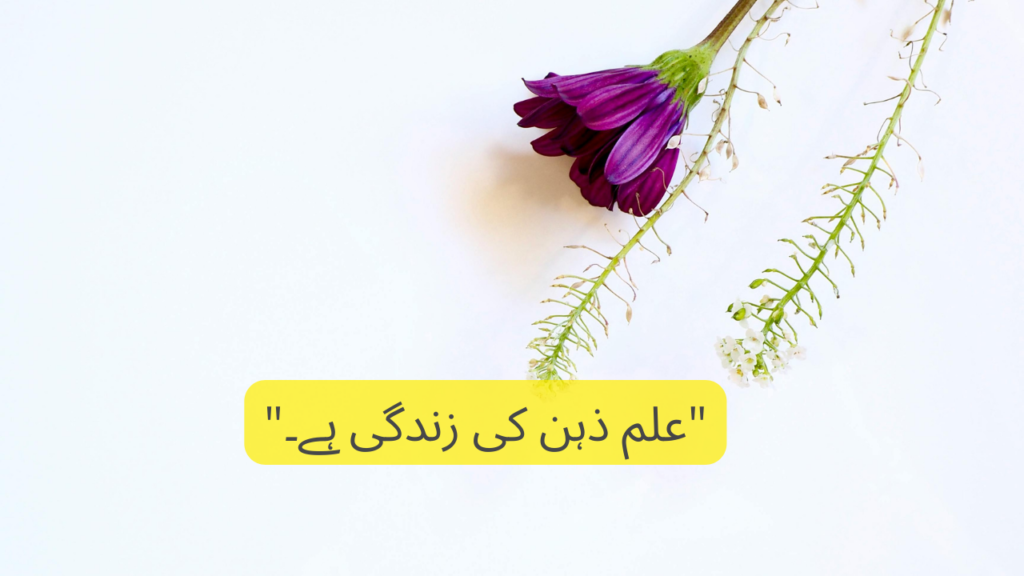
“علم ذہن کی زندگی ہے۔”
“Knowledge is the life of the mind.”
“Knowledge is the life of the mind” suggests that just as the body needs nourishment to thrive, the mind requires knowledge to grow and stay vibrant. Knowledge feeds the mind, shaping our thoughts, enhancing our understanding, and expanding our perception of the world. It brings clarity, helping us make informed decisions and solve problems effectively. Without knowledge, the mind remains limited, unable to fully realize its potential. Knowledge allows us to engage with others thoughtfully, appreciate different perspectives, and cultivate wisdom. It drives innovation and creativity, inspiring new ideas and solutions. In essence, knowledge enriches the mind, empowering us to live meaningful, purposeful lives.
“علم انسان کے ذہن کے لیے وہی مقام رکھتا ہے جو زندگی جسم کے لیے رکھتی ہے۔ علم ہمارے خیالات کو روشنی دیتا ہے اور ہمیں شعور اور فہم عطا کرتا ہے۔ جیسے جسم کو زندہ رہنے کے لیے خوراک کی ضرورت ہوتی ہے، اسی طرح ذہن کو بیدار اور زندہ رکھنے کے لیے علم ضروری ہے۔ علم ہماری سوچ کو وسیع کرتا ہے اور ہمیں مختلف موضوعات پر غور و فکر کرنے کی صلاحیت دیتا ہے۔ بغیر علم کے ذہن بند اور محدود رہتا ہے، اور ہم زندگی کے حقیقی معنی کو نہیں سمجھ سکتے۔ علم ہمیں حقیقت اور دانائی سے روشناس کراتا ہے اور ہمیں صحیح راستہ دکھاتا ہے۔ اس لیے علم کو ذہن کی زندگی کہا گیا ہے۔”
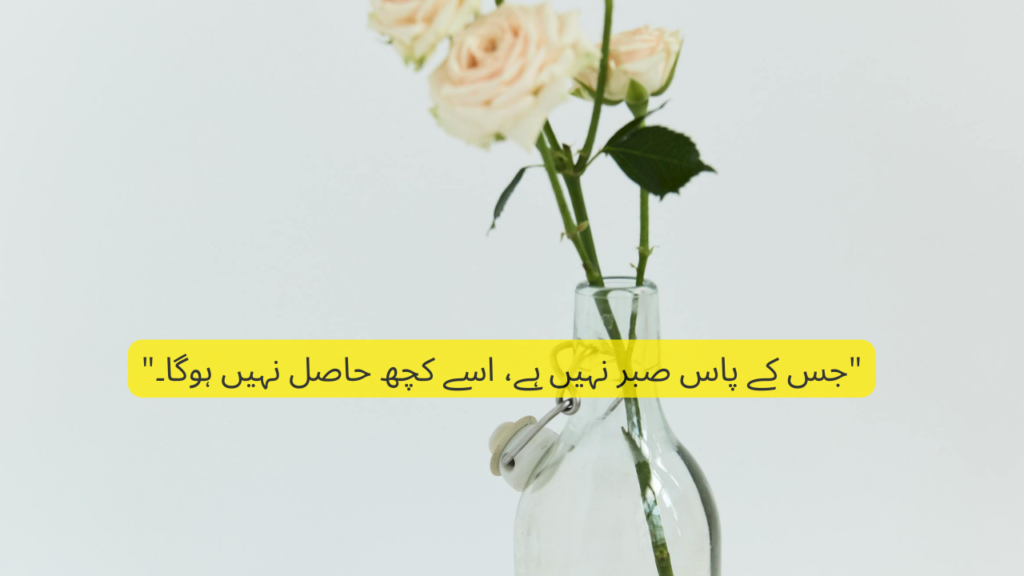
“جس کے پاس صبر نہیں ہے، اسے کچھ حاصل نہیں ہوگا۔”
“He who does not have forbearance, will not get anything.”
Forbearance, or patience, is essential for success in any aspect of life. A person without forbearance often reacts impulsively, which can lead to poor decisions and missed opportunities. With patience, one can face challenges calmly, learn from experiences, and make wiser choices. Forbearance helps people endure hardships without giving up, allowing them to reach their goals in the long run. It brings clarity of thought, helping one see beyond immediate difficulties and work toward lasting achievements. Without it, frustration can lead to setbacks and failure. In essence, forbearance is the foundation of resilience and achievement, and those lacking it may struggle to accomplish their objectives.
“صبر ایک عظیم خوبی ہے جو انسان کو کامیابی کی طرف لے جاتی ہے۔ جس شخص میں صبر نہیں ہوتا، وہ جلدبازی اور بےچینی کی وجہ سے اپنے مقاصد کو حاصل نہیں کر پاتا۔ صبر انسان کو مشکل حالات میں حوصلہ اور برداشت عطا کرتا ہے، اور اس کے ذہن کو پرسکون رکھتا ہے۔ اگر کسی شخص میں صبر نہ ہو تو وہ چھوٹی چھوٹی ناکامیوں سے مایوس ہو جاتا ہے اور آگے بڑھنے کا حوصلہ کھو دیتا ہے۔ صبر کی مدد سے انسان بڑے بڑے مسائل کا سامنا کر سکتا ہے اور کامیابی حاصل کر سکتا ہے۔ صبر کے بغیر انسان جلد ہار مان لیتا ہے اور مشکلات سے بھاگتا ہے۔ لہٰذا، صبر کے بغیر کچھ بھی حاصل کرنا ممکن نہیں۔ صبر کے ذریعے انسان زندگی میں سکون، کامیابی، اور اطمینان حاصل کر سکتا ہے۔”
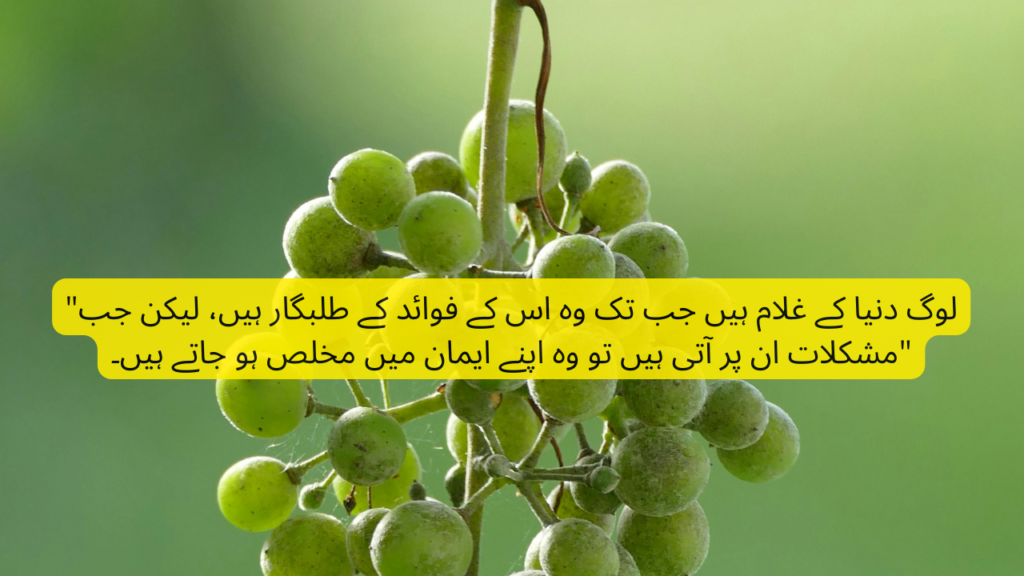
“لوگ دنیا کے غلام ہیں جب تک وہ اس کے فوائد کے طلبگار ہیں، لیکن جب مشکلات ان پر آتی ہیں تو وہ اپنے ایمان میں مخلص ہو جاتے ہیں۔”
“People are slaves to this world as long as they seek its benefits, but when trials befall them, they become sincere in their faith.”
People often get absorbed in the material benefits and comforts of the world, attaching their happiness to wealth, status, or possessions. When life is easy, they may neglect deeper spiritual or moral commitments. However, when hardships or challenges arise, material comforts no longer provide the solace they seek. It is during these tough times that people often turn to their faith sincerely, seeking strength, guidance, and meaning beyond worldly gains. Trials remind them of the limitations of worldly attachments and push them to connect more deeply with their beliefs. In essence, difficulties can strip away superficial attachments, revealing true faith and a reliance on something greater than the material world.
یہ بات ظاہر کرتی ہے کہ انسان اس دنیا کے فائدوں کے پیچھے دوڑتا ہے اور اس کے تمام وسائل اور خوشیوں کو حاصل کرنے کی کوشش کرتا ہے۔ جب تک وہ دنیا کے فوائد میں مگن رہتا ہے، وہ حقیقت میں دنیا کا غلام بن جاتا ہے۔ مگر جب کوئی پریشانی یا مشکل آتی ہے، تب اس کی نظر اپنے ایمان کی طرف مڑ جاتی ہے اور وہ اپنے اللہ کے ساتھ سچا تعلق قائم کرتا ہے۔ مشکلات انسان کو خدا کی طرف رجوع کرنے پر مجبور کرتی ہیں۔ اس وقت وہ اپنے دل سے اللہ کی مدد کی دعا کرتا ہے اور اس کی رضا کے لیے عمل کرتا ہے۔ یہ بھی سچ ہے کہ دنیا کی تکلیفیں انسان کو اپنی کمزوری اور حقیقت کا احساس دلاتی ہیں۔ دراصل انسان کی اصل طاقت ایمان میں ہے، اور یہ ایمان تب ہی مضبوط ہوتا ہے جب انسان مشکلات کا سامنا کرتا ہے۔ اس طرح، یہ دکھاتا ہے کہ انسان کو دنیا کی حقیقت سمجھنی چاہیے اور ہمیشہ اپنے ایمان کی طرف مخلص رہنا چاہیے۔

“اپنے دشمن کو ہارنے کا بہترین طریقہ یہ ہے کہ اسے اپنا دوست بنا لو۔”
“The best way to defeat your enemy is to make him your friend.”
The quote “The best way to defeat your enemy is to make him your friend” emphasizes the power of reconciliation and peace over conflict. Instead of continuing a cycle of animosity and hostility, turning an enemy into a friend can lead to mutual understanding and respect. By building bridges and resolving differences, you not only neutralize the threat posed by the enemy but also gain an ally. This approach fosters unity and cooperation, turning negative energy into positive outcomes. It also reflects wisdom, as it avoids unnecessary conflict and promotes harmony. Moreover, making a friend out of an enemy can disarm them and weaken their power over you. It shows that strength lies not in violence, but in understanding and forgiveness. In the end, transforming enemies into friends is a victory of compassion and intelligence over bitterness and revenge.
“دشمن کو شکست دینے کا بہترین طریقہ یہ ہے کہ اسے اپنا دوست بنا لیا جائے۔” اس قول کا مطلب ہے کہ دشمنی کو محبت اور دوستی سے ختم کیا جا سکتا ہے۔ جب ہم کسی دشمن کو اپنے ساتھ ملاتے ہیں، تو نہ صرف اس کی نفرت کم ہوتی ہے بلکہ ایک مضبوط رشتہ بھی قائم ہوتا ہے۔ یہ طریقہ نفرت کی بجائے سمجھوتے اور تعاون پر زور دیتا ہے۔ دوستی کی بنیاد پر تعلقات میں بہتر بات چیت اور مسائل کا حل آسان ہو جاتا ہے۔ دشمن کو دوست بنانا ہمیں اپنی صلاحیتوں اور اخلاقی قوت کو ظاہر کرنے کا موقع فراہم کرتا ہے۔ اس سے ہم عالمی سطح پر امن اور تعاون کو فروغ دے سکتے ہیں۔ دشمنی کے بجائے دوستی انسانیت کے لیے فائدہ مند ثابت ہو سکتی ہے۔ اس عمل سے ہم ایک مثبت ماحول تخلیق کر سکتے ہیں، جو ترقی اور سکون کا باعث بنتا ہے۔
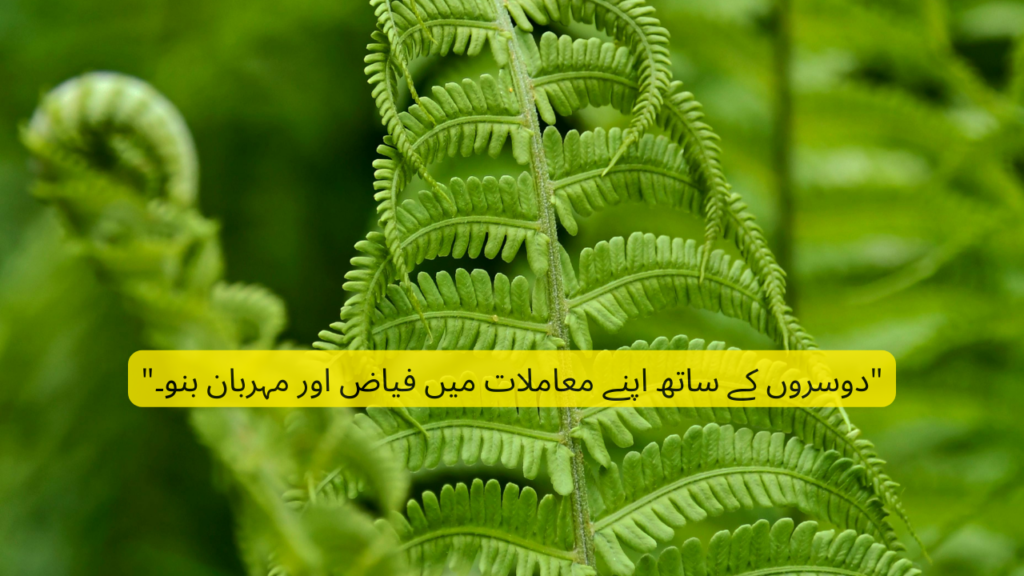
“دوسروں کے ساتھ اپنے معاملات میں فیاض اور مہربان بنو۔”
“Let your treatment of others be generous and kind.”
“Let your treatment of others be generous and kind” encourages us to show compassion and empathy in our interactions with others. It reminds us to be considerate, not only in our actions but also in our words. Generosity isn’t just about material giving; it can also mean offering time, patience, and understanding. Kindness creates an environment where people feel valued and respected. This attitude helps to build trust and strengthen relationships. By being generous and kind, we contribute positively to the well-being of those around us. It fosters goodwill and cooperation, making the world a more harmonious place. Small acts of kindness can have a big impact on someone’s life. Ultimately, treating others with kindness reflects our own character and humanity.
ہمیں دوسروں کے ساتھ ہمدردی اور محبت کے ساتھ پیش آنے کی ترغیب دیتا ہے۔ یہ ہمیں یاد دلاتا ہے کہ ہمارے عمل اور الفاظ میں دوسروں کے لیے غور و فکر اور احترام ہو۔ سخاوت صرف مادی چیزوں تک محدود نہیں، بلکہ وقت، صبر، اور سمجھ بوجھ دینے کی صورت میں بھی ہو سکتی ہے۔ مہربانی ایک ایسا ماحول پیدا کرتی ہے جس میں لوگ خود کو اہم اور قدر کی نگاہ سے دیکھتے ہیں۔ اس رویے سے اعتماد اور تعلقات مضبوط ہوتے ہیں۔ سخاوت اور مہربانی سے ہم اپنے ارد گرد کے لوگوں کی فلاح میں حصہ ڈالتے ہیں۔ چھوٹے چھوٹے اعمال بھی کسی کی زندگی پر بڑا اثر ڈال سکتے ہیں۔ آخرکار، دوسروں کے ساتھ اچھا سلوک ہمارا اپنا کردار اور انسانیت ظاہر کرتا ہے۔ اس طرح ہم دنیا کو بہتر اور ہم آہنگ بنا سکتے ہیں۔
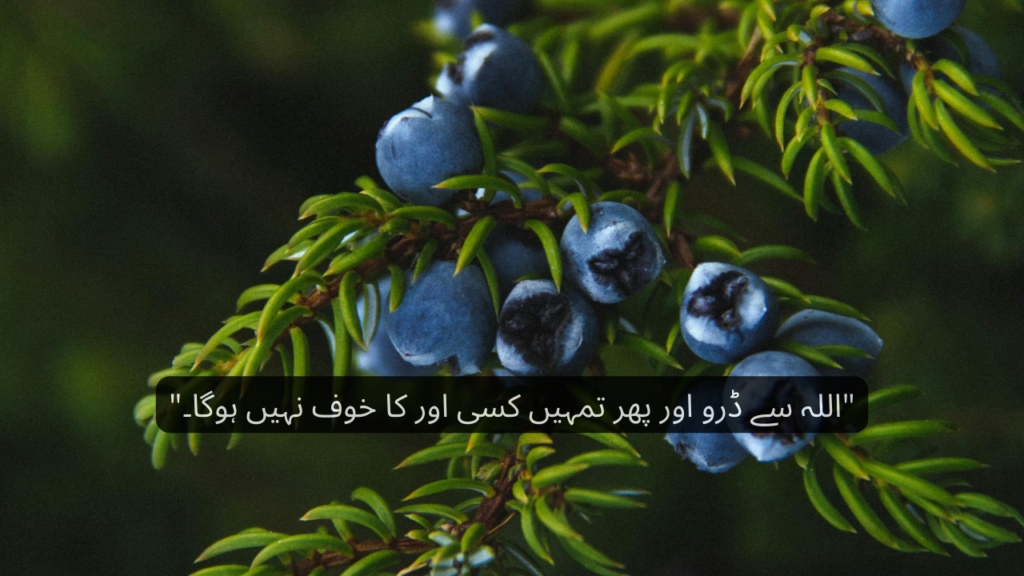
“اللہ سے ڈرو اور پھر تمہیں کسی اور کا خوف نہیں ہوگا۔”
“Fear God and you will not fear others.”
“Fear God and you will not fear others” means that when you have a strong reverence and trust in God, no earthly fear can overpower you. True fear in this context refers to a sense of awe and respect for God’s power, wisdom, and justice. When you rely on God and acknowledge His supremacy, you find courage and peace, knowing that He is in control of all matters. This faith reduces the fear of people, circumstances, or challenges, as you understand that nothing happens without God’s will. It empowers you to face difficulties with strength and confidence. Fearing God leads to a sense of inner security and protection. You realize that human opinions and worldly threats hold no power over you compared to God’s authority. In turn, this belief frees you from anxiety and helps you live with integrity. Ultimately, this principle teaches that the fear of God is the foundation of true courage and peace.
کا مطلب ہے کہ جب آپ اللہ کی عظمت اور طاقت سے خوف کھاتے ہیں، تو دنیا کے کسی بھی شخص یا صورتحال سے خوف محسوس نہیں ہوتا۔ یہاں “خوف” کا مطلب صرف ڈر نہیں، بلکہ اللہ کی رضا اور اس کی حکمت کا احترام ہے۔ جب آپ کا ایمان اللہ پر مضبوط ہوتا ہے، تو آپ کو یہ یقین ہوتا ہے کہ وہ ہر چیز پر قادر ہے۔ اس اعتماد سے آپ دنیا کی مشکلات، لوگوں کی دھمکیوں یا خوف سے آزاد ہو جاتے ہیں۔ اللہ کے خوف سے انسان کو اندرونی سکون اور حوصلہ ملتا ہے، کیونکہ وہ جانتا ہے کہ اللہ کے سوا کسی اور کی تقدیر پر اختیار نہیں۔ اس ایمان کے ذریعے انسان کی جرات بڑھتی ہے اور وہ ہر مشکل کا سامنا بے خوف ہو کر کرتا ہے۔ اللہ کا خوف انسان کو دنیاوی خوف سے آزاد کر دیتا ہے، اور وہ حق کی طرف قدم بڑھاتا ہے۔ یہ اصول بتاتا ہے کہ اللہ کا خوف ہی حقیقی سکون اور جرات کا باعث بنتا ہے۔

“غم نہ کرو۔ جو چیز تمہارے ہاتھ سے جاتی ہے، وہ نئی شکل میں واپس آتی ہے۔”
“Do not grieve. Anything you lose, comes round in new form.”
“Do not grieve. Anything you lose, comes round in new form” suggests that loss is a natural part of life, but it does not mean the end. When we lose something—be it a person, opportunity, or possession—there is always the possibility of something new coming into our lives. This idea encourages acceptance and trust in the cyclical nature of life. It reminds us that change often brings growth and transformation. What we lose might be replaced in a different form, even if it’s not immediately visible. This message promotes resilience, teaching us that nothing truly disappears forever. Loss can pave the way for new beginnings and unexpected blessings. By embracing change, we free ourselves from the grip of grief. Ultimately, it encourages hope and faith that life always moves forward, bringing new possibilities.
کا مطلب ہے کہ زندگی میں نقصان ایک قدرتی عمل ہے، لیکن یہ آخر نہیں ہوتا۔ جب ہم کچھ کھو دیتے ہیں—چاہے وہ شخص ہو، موقع ہو، یا کوئی چیز—تو ہمیشہ یہ امکان ہوتا ہے کہ کچھ نیا ہمارے سامنے آئے گا۔ یہ خیال ہمیں تبدیلی کو قبول کرنے اور زندگی کی چکر کی نوعیت پر اعتماد کرنے کی ترغیب دیتا ہے۔ ہمیں یاد دلاتا ہے کہ جو کچھ ہم کھوتے ہیں، وہ کسی نہ کسی نئے روپ میں واپس آ سکتا ہے، چاہے وہ فوراً نظر نہ آئے۔ اس پیغام کا مقصد ہمیں لچک دکھانے کی تعلیم دینا ہے کہ کچھ بھی ہمیشہ کے لیے ختم نہیں ہوتا۔ نقصان کبھی کبھی نئی شروعات اور ان دیکھے مواقع کی طرف رہنمائی کرتا ہے۔ اس سے ہمیں تبدیلی کو گلے لگانے کا حوصلہ ملتا ہے اور غم سے آزاد ہو جاتے ہیں۔ آخرکار، یہ ہمیں امید اور یقین دلاتا ہے کہ زندگی ہمیشہ آگے بڑھتی ہے اور نئے امکانات لاتی ہے۔
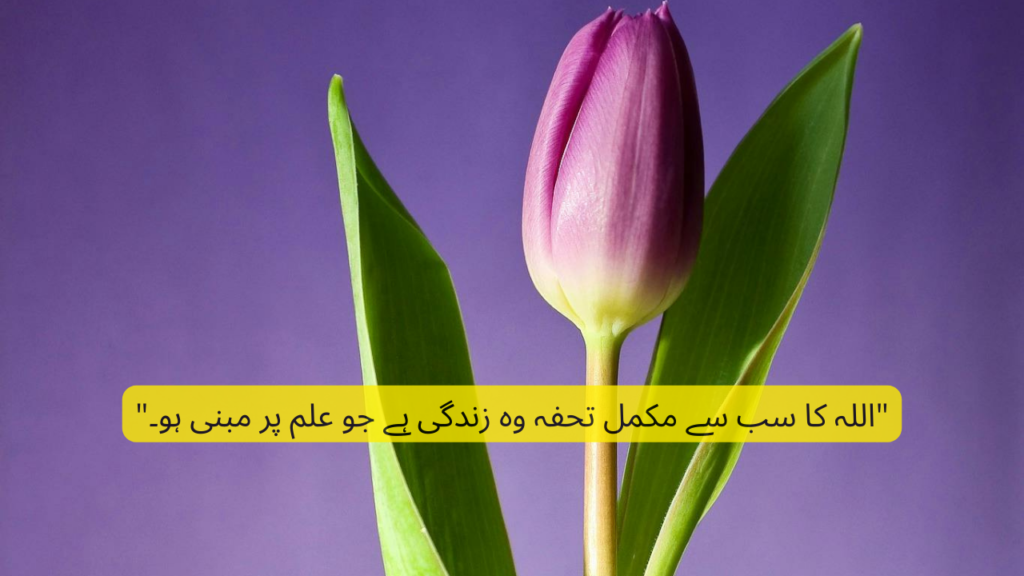
“اللہ کا سب سے مکمل تحفہ وہ زندگی ہے جو علم پر مبنی ہو۔”
“The most complete gift of God is a life based on knowledge.”
“The most complete gift of God is a life based on knowledge” emphasizes the immense value of wisdom and understanding in life. Knowledge empowers us to make better decisions, understand the world around us, and lead a more meaningful existence. It is through knowledge that we gain insight into ourselves and others, helping to build compassion, tolerance, and respect. A life rooted in knowledge brings clarity, purpose, and direction. It helps us navigate challenges with confidence and enables personal growth. Knowledge is a gift that keeps giving, as it continually enriches our lives. Moreover, a knowledgeable person is better equipped to contribute positively to society. Ultimately, the foundation of a fulfilling and purposeful life is built on the pursuit of knowledge, which brings us closer to truth and wisdom.
کا مطلب ہے کہ اللہ کا سب سے قیمتی تحفہ وہ زندگی ہے جو علم پر مبنی ہو۔ علم انسان کو بہتر فیصلے کرنے کی صلاحیت فراہم کرتا ہے اور دنیا کو سمجھنے میں مدد دیتا ہے۔ یہ علم ہمیں اپنے آپ اور دوسروں کو بہتر طریقے سے سمجھنے کی طاقت دیتا ہے، جس سے ہم میں ہمدردی، برداشت اور احترام پیدا ہوتا ہے۔ علم سے زندگی کو مقصد اور سمت ملتی ہے، اور یہ ہمیں چیلنجز کا سامنا اعتماد کے ساتھ کرنے کی طاقت دیتا ہے۔ علم ایک ایسا تحفہ ہے جو ہمیشہ بڑھتا رہتا ہے اور ہماری زندگی کو مسلسل بہتر کرتا ہے۔ ایک علم والا شخص اپنے ماحول میں مثبت تبدیلی لانے کے قابل ہوتا ہے۔ اس کے علاوہ، علم ہمیں حقیقت اور حکمت کے قریب لے آتا ہے، اور زندگی کو مزید بامقصد بناتا ہے۔ علم کی تلاش ایک ایسا راستہ ہے جو انسان کو مکمل اور کامیاب زندگی کی طرف رہنمائی فراہم کرتا ہے۔
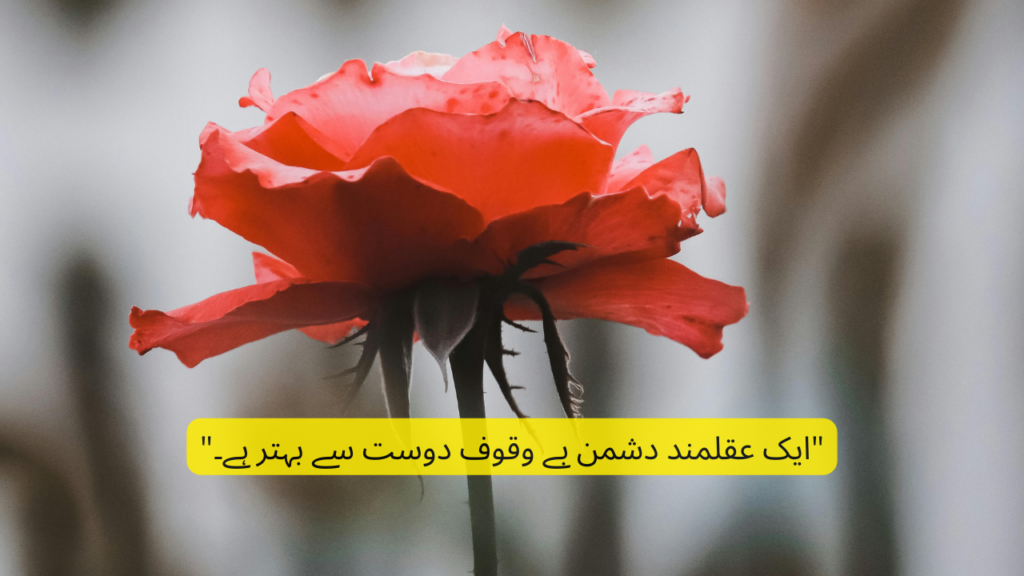
“ایک عقلمند دشمن بے وقوف دوست سے بہتر ہے۔”
“An intelligent enemy is better than a foolish friend.”
“An intelligent enemy is better than a foolish friend” means that it’s preferable to have an adversary who is smart, strategic, and aware of their actions, rather than a friend who lacks wisdom and makes poor decisions. A wise enemy can challenge you in meaningful ways, helping you grow stronger and more aware. On the other hand, a foolish friend might lead you into trouble or bring harm due to their lack of judgment. A clever opponent can push you to sharpen your skills, while a naive friend might hold you back without realizing it. This idea highlights the importance of surrounding yourself with people who have good judgment, even if they may not always be on your side. A foolish friend may mislead you with bad advice, while an intelligent enemy, although a challenge, will at least keep you alert and prepared. Ultimately, having a capable enemy may help you build resilience and wisdom, whereas a foolish friend can create unnecessary risks. This principle stresses the value of wisdom in relationships, whether in friendship or opposition.
“”ایک ذہین دشمن بے وقوف دوست سے بہتر ہے” کا مطلب یہ ہے کہ ایک سمجھدار دشمن وہی شخص ہوتا ہے جو آپ کے سامنے صاف اور واضح طور پر اپنی دشمنی ظاہر کرتا ہے۔ اس کے برعکس، ایک بے وقوف دوست نہ صرف غیرمحتاط ہوتا ہے بلکہ اپنی نادانی سے نقصان بھی پہنچا سکتا ہے۔ دشمن کے منصوبے کو سمجھ کر آپ خود کو بچا سکتے ہیں، مگر بے وقوف دوست کی بے خبری یا نادانی آپ کو نقصان پہنچا سکتی ہے۔ ایک ذہین دشمن بھی کبھی کبھی اچھے مشورے دے سکتا ہے، جبکہ بے وقوف دوست کی باتیں یا حرکتیں الٹی پڑ سکتی ہیں۔ اس لیے دوست اور دشمن دونوں میں ذہانت کو فوقیت دی گئی ہے۔


